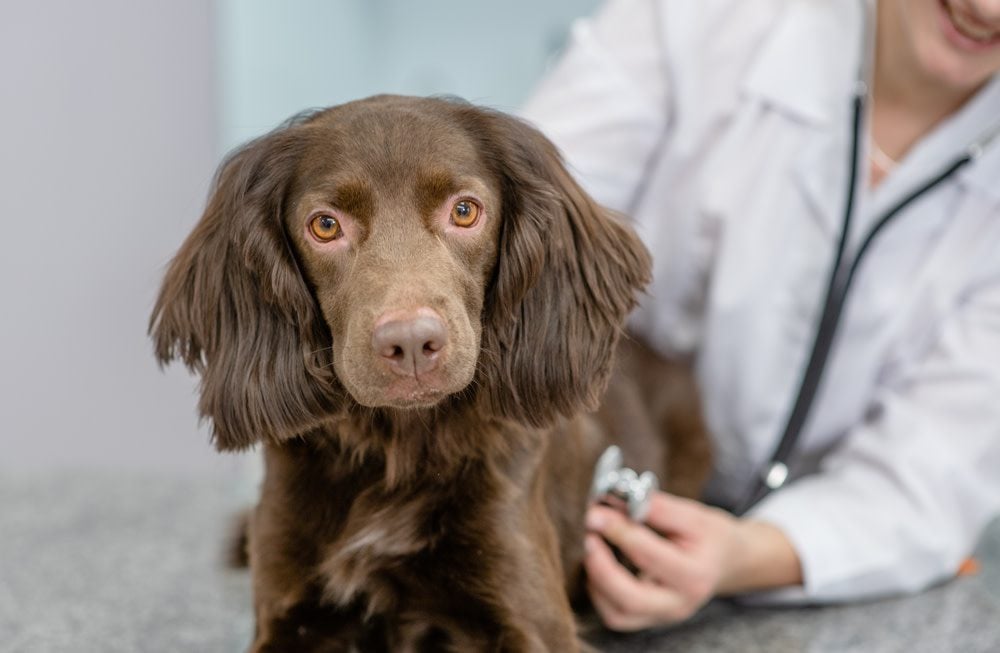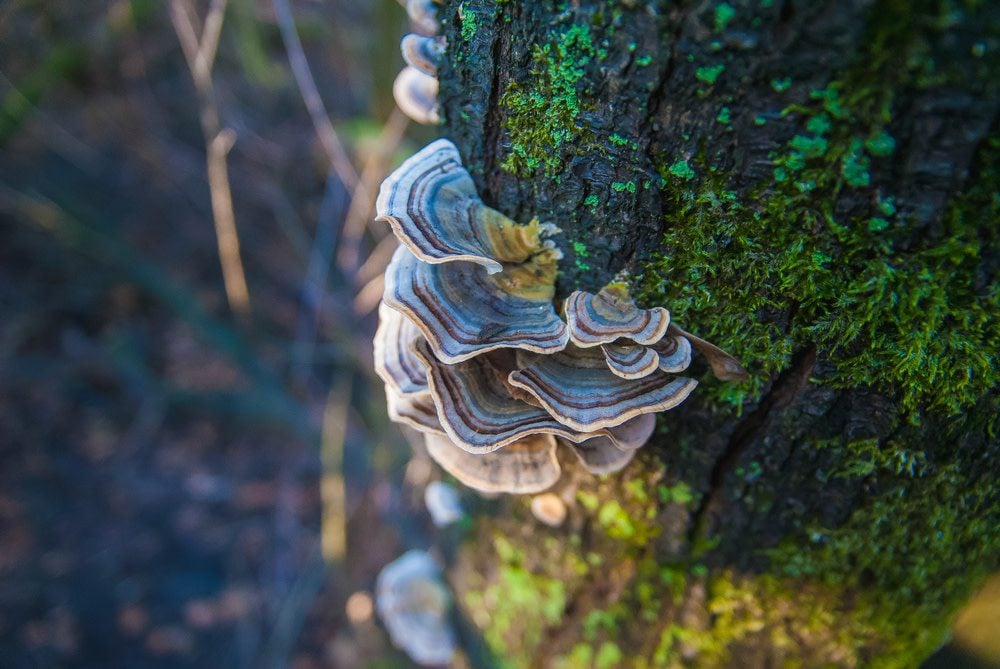How Turkey Tail Mushroom Can Assist With a Dog’s Cancer Treatment

Table of Contents
All dogs are at risk of developing cancer. It’s a cruel disease that attacks both purebreds and mixed breeds, shortening the life expectancy of special companions.
However, treatments and natural remedies can help slow down the progression and even prevent the disease. By strengthening cancer-fighting cells, your dog may have the chance to fight for its life.
Turkey Tail mushrooms are the buzzword in oncology-related conversations. Medicinal mushrooms like the Turkey Tail have undergone clinical trials to prove their effectiveness in boosting the immune system response, slowing the growth of cancer cells, and reducing the harsh side effects of radiation therapy or chemotherapy.
While most Turkey Tail studies have related to humans, it’s believed that the mushroom can be mutually beneficial for furry friends.
Signs Your Dog Might Have Cancer

Seeing your pet ill is worrisome. Unfortunately, cancer can often grow undiagnosed for many months and even years.
A lot of the symptoms of cancer can also signal other diseases. If your dog is over ten, its chances of cancer are increased by 50%. Make sure to take your pet for their annual or bi-annual physical exam. The key to overcoming cancer is early diagnosis.
Physical Signs
- Lumps and skin thickening are the most common signs of cancer in dogs. Just as humans are told to feel for and be aware of any changes under their skin, it’s important to observe similar changes in your pet.
- If your dog has a sore that isn’t healing, you need to get them checked out.
- Unexplained bleeding from their nose, gums, mouth, or blood in their vomit, urine, or stool is also a serious indication.
- Lameness that does not go away is a warning sign.
- Internal bleeding or rapid swelling of the abdomen can indicate a tumor.
- Is your dog losing weight and “wasting away?” Take them to the vet.
Behavioral Signs
At times there are no physical signs at all. When a pet isn’t feeling well, its behavior may change. Signs of pain include decreased energy level, loss of appetite, vocalizations, dull eyes, biting themselves, separation, and signs of depression. Rather than attribute this behavior to “old age,” take your dog for a checkup.
Most Common Cancer in Dogs
According to the Animal Cancer Foundation, the most common cancers in dogs include:
- Canine Mammary Gland Tumor – Also known as breast cancer, mammary tumors are the most common tumor type in female dogs in the senior stage of their life. These tumors have a 50-50 chance of being malignant or benign. Malignant tumors can spread throughout the body and eventually affect the lymph nodes. A vet will often suggest surgical removal.
- Lung Cancer – Tumors in the lungs are common in older dogs who display an irritating cough.
- Soft Tissue Sarcomas – Sarcomas make up approximately 10–15% of malignant tumors in dogs. 20% of these tumors originate in the bone, and the other 80% represent soft tissue sarcomas in fibrous tissue, fat, smooth muscle, nerves, skin, or lymph vessels. Depending on the location, there are different names for these types of soft tissue cancers:
- Hemangiosarcoma presents in the spleen, heart, liver, and skin, and subcutis.
- Fibrosarcoma occurs in the skin, subcutaneous space, and oral cavity.
- Neurofibrosarcoma (or Peripheral nerve sheath tumors (PNST) have a nerve sheath origin and occur throughout the body.
- Osteosarcoma and Chondrosarcoma are bone tumors.
- Melanoma – Found in the mouth of dogs, this is a common tumor in canines. It can also be found on your dog’s paws and are locally invasive, often entering the bone of the jaw or toe.
- Mast Cell Tumors – Common in large or giant breeds, Mast Cell Tumors are the most common skin tumor type in dogs.
- Lymphoma – Presents in 7% of all cancers in dogs. Lymphoma is a cancer of the lymph nodes.
Diagnosing and Treating Your Dog

Regular wellness exams are an important responsibility for all pet parents. Keeping your pet’s body weight under control, caring for their health by exercising them, feeding a good diet, and boosting their immune system when they need it are all ways that you can be the best pet parent.
Veterinary oncologist Dr. Rachel Reiman was asked in an interview what pet parents must do if they suspect their dog has cancer.
“We rely on our family veterinarians to be our first line of defense because they see those patients on a yearly or semi-yearly basis. We want them to be the first to look at new lumps and bumps as they’re noticed since they keep track of weight, body condition, and all of those things. What we see as veterinary oncologists is a snapshot in time. Your family vet will be able to detect weight loss and keep track of new lumps or bumps that weren’t on their previous visit records. It’s important to set up a relationship with that veterinarian because they know your pet the best.”
Reiman’s response tells us that the best way to identify and treat cancer is to have a relationship with a vet with a record of your pet’s health information. Seeking advice, diagnosis, or treatment online or from a “know-it-all” neighbor will only make you panic.
Routine Tests for Canine Cancer
Cancer tests are very specific, depending on the suspected cancer type. However, oncologists may run basic routine tests to identify other possible causes relating to the symptoms and history. Since most dogs diagnosed with cancer are in their senior years, other diseases are also a possibility.
Tests may include:
- Blood work
- X-rays / Digital radiograph
- Abdomen ultrasound
- MRI or CT scan
- Cytology: Microscopic cell evaluation to determine if cells are malignant or benign.
- Bone Marrow Aspirate: A painless removal and evaluation of bone marrow cells to assess whether the cells are normal or if cancer has invaded them.
- Biopsy: a surgical procedure that involves removal of a piece of the tumor for analysis by a pathologist.
Cancer Treatment Options
Once your veterinary oncologist has reached a diagnosis for your pet, you can discuss cancer treatment options. There is no one-size-fits-all for cancer patients, and while some methods of cancer treatments are highly recommended, like surgery, others are optional.
Often there are different approaches for different types of cancer, some more high risk than others. Discuss the risks versus benefits of each treatment type with your vet.
Vaccination – Animal studies have shown promising results for the development of cancer vaccines. A vaccine for the treatment of bone cancer in dogs saw dogs having almost doubled their remission time compared to those who went through chemotherapy.
Surgery – Surgery is often the most effective form of treatment for cancer, intending to remove cancerous cells and lumps. This method is effective before the tumor grows too large or spreads beyond its site. However, the removal of organs or cancerous limbs can affect your pet’s quality of life.
Chemotherapy and Radiation – Both chemotherapy and radiation therapy are executed through a series of visits and aim to destroy cancerous cells in the body. They can have toxic results in the body, and immunotherapy is needed following this treatment plan.
Immunotherapy – A process of stimulating an immune response against disease.
Some treatment plans will be used in isolation, while others will be used in combination with other treatments.
Turkey Tail Mushroom for Dogs with Cancer

Turkey Tail mushrooms, scientifically named Trametes Versicolor or Coriolus Versicolor, is a stemless, fanlike, colorful mushroom that grows on dead logs worldwide. The Trametes Versicolor mushroom, like many others, boasts medicinal benefits thanks to beta-D-glucans.
These beta-glucans are made up of protein-bound polysaccharide-K (PSK) and polysaccharide peptide (PSP). These important medicinal components form a part of the Turkey Tail mushroom cell wall.
Beta-glucans are non-digestible fibers (prebiotics) that help feed the microbial flora (probiotics). Foods and supplements of this nature have been associated with immune-modulating effects and other health benefits.
A clinical trial of Trametes Versicolor saw how beta-glucans could impact immune function and even alter immune cells. This is particularly beneficial for pet parents who want to carry out immunotherapy as part of their pet’s cancer treatment.
What are the Benefits of Turkey Tail Mushrooms?
Turkey Tail Mushrooms aren’t just for dogs fighting cancer. They can also be taken as a dietary supplement for general wellness. The benefits include:
- A potent antioxidant with the ability to fight free radicals
- Rich in calcium and minerals, vitamins B1, B2, C, and D
- Contains Selenium, which is beneficial for the thyroid, regulating blood pressure, heart health, and more
- Contains Eritadenine lowers cholesterol levels
- Improved immune system function
- Prebiotic for digestion and gut health
- The mushrooms may reduce inflammation
Potential Risks and Side Effects
Turkey Tail Mushrooms are considered safe with very few adverse reactions. However, use caution when adding any new item to your pet’s diet or medical cupboard. Contact your vet if you have any concerns following administration.
Side effects may include:
- Allergies with reactions of diarrhea, vomiting, or both.
- Contraindication for patients receiving bone marrow transplants or those with autoimmune diseases.
- Rare reports of liver impact, so dogs that have liver issues should have their liver enzymes monitored.
- Hypoglycemic effects, or low blood sugar, are also a possibility with Turkey Tail extract. Side effects of hypoglycemia include weakness, anxiety, heart palpitations, and confusion.
- Low blood pressure; dogs on hypertensive drugs or blood thinners should not indulge in this mushroom remedy.
Follow dosage guidelines to avoid overdose and toxicity.
Turkey Tail Mushroom Cancer Research
In Asia, cancer is treated with over 100 different types of mushrooms. The more common mushrooms are Ganoderma Lucidum (Reishi), Trametes Versicolor or Coriolus Versicolor (Turkey Tail), Lentinus edodes (Shiitake), and Grifola frondosa (Maitake). In Japan, PSK is an approved mushroom supplement for integrative oncology treatment in humans.
Before treating humans, animal studies are performed to test the effects of PSK or PSP on the immune system and its natural killer cells. Following evidence of antitumor activity, people with cancer have tried the mushroom extract.
Here are some of the findings:
- The National Cancer Institute reported medically reviewed results from a phase 1 clinical trial sponsored by the National Institutes of Health. In the trial, breast cancer patients were given Turkey Tail extract products after radiation therapy. Cancer-fighting cells increased.
- The National Cancer Institute also reported six randomized clinical trials in lung cancer patients who went through chemotherapy with or without PSK. Patients who received PSK from Turkey Tail improved in one or more ways, including body weight, immune function, general well-being, tumor-related symptoms, or longer survival.
- The American Journal of Chinese Medicine found evidence of antitumor effects in mice.
- A study in women with breast cancer who were given Turkey Tail extract found that the supplement had slowed down the spreading of tumors and had a toxic action against breast cancer cells, inhibiting their action of inflammation.
- A review by PM Kidd looked at 1970 Japanese trials on polysaccharopeptides (PSP) from Turkey Tail. The results included life improvement, pain relief, and enhanced immune status in 70-97% of cancer patients with gastric cancer, esophagus cancer, lung cancer, and ovary cancer.
- Clinical trials in people with cancer of the lungs showed results with PSP treatment. Those who received PSP isolated from Coriolus Versicolor showed slower cancer deterioration.
- A 2019 study identified the Turkey Tail’s mechanism of action as inhibiting colon cancer cell growth and migration in human colon cancer cells.
Turkey Tail Mushrooms and Chemotherapy
Chemotherapy controls the spread of cancer. It isn’t used for all cancer forms and is most effective for cancers that affect the whole body, like Lymphoma or tumors that cannot be fully removed. Dogs tolerate chemotherapy well, with less than 5% of adverse reactions being life-threatening.
Yun Zhi, the name for Trametes Versicolor mushrooms in China, has been used for some human patients as a co-treatment option with their chemotherapy. The results have shown that Turkey Tail mushrooms may prolong survival time in patients with breast cancer, gastric cancer, or colorectal cancer treated with chemotherapy. For this specific study, there was a 9% reduction in 5-year mortality.
While the harsh drugs in chemotherapy can cause damage to healthy cells, it’s still one of the most effective forms of treatment. When given with mushroom Trametes Versicolor, the effects are more favorable with longer survival time and fewer adverse reactions. For women with breast cancer, turkey tail has been described as “chemotherapy-compatible.”
Using Turkey Tail Mushrooms for Dogs in a Cancer Treatment Plan
Cancer patients can have improved recovery, fewer side effects, and greater tolerance to their choice of treatment with medicinal mushroom dietary supplements. It’s important to note that the Food and Drug Administration does not approve dietary supplements like Trametes Versicolor. Therefore it is important to seek medical advice, diagnosis, and approval from your veterinary oncologist to use medicinal mushroom products.
Make sure you buy from a reputable company that uses organic, non-GMO, allergen-free ingredients. Products should be tested for quality and purity.
Final Thoughts on Turkey Tail Treatment

Seek advice, diagnosis, or treatment from an expert if you are concerned about your pet. Your animal’s health is your responsibility, but you don’t have to deal with a cancer diagnosis alone.
Cancer treatments can be supported, immune health can be improved, and life quality enriched with Turkey Tail medicinal mushrooms. Studies into this colorful little fungi are extensive, with rich historical use in traditional Chinese medicine and now a useful application for integrative oncology.
Why not speak to your vet about Turkey Tail Mushrooms today?
Frequently Asked Questions
Does turkey tail mushroom cure cancer?
No, but cancer patients can have improved recovery, fewer side effects, and greater tolerance to their choice of treatment with the addition of medicinal mushrooms.
Does Turkey tail kill cancer cells?
Turkey Tail can slow the spread of cancer cells by encouraging the growth of immune cells.
What is the best mushroom to fight cancer?
In Asia, cancer is treated with over 100 different types of mushrooms. The more common ones are Ganoderma Lucidum (Reishi), Trametes Versicolor or Coriolus Versicolor (Turkey Tail), Lentinus edodes (Shiitake), and Grifola frondosa (Maitake).
Can you take too much turkey tail mushroom?
Turkey Tail Mushrooms are considered safe with very few adverse reactions. Follow dosage guidelines to avoid overdose and toxicity.















